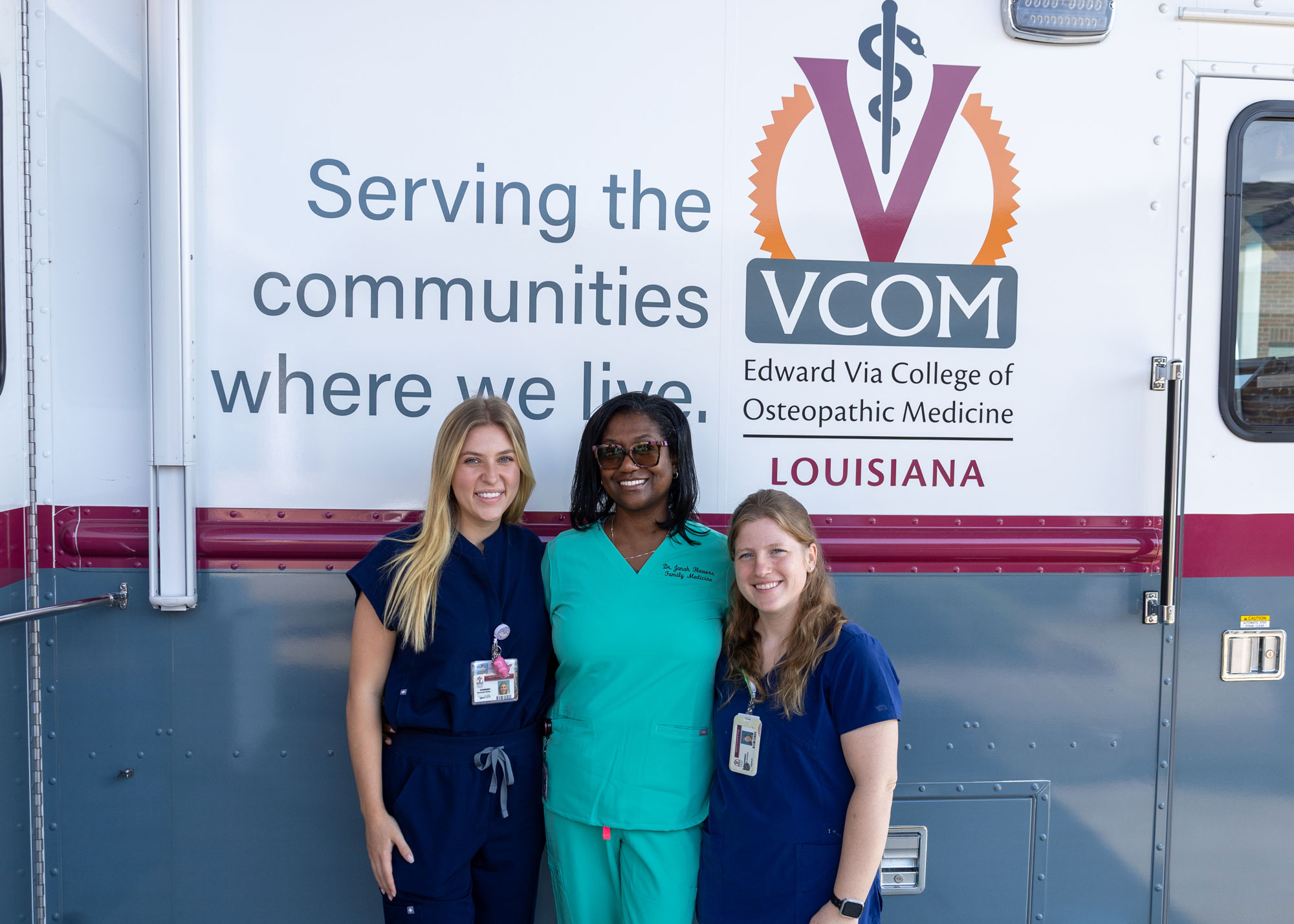
VCOM-Louisiana’s large mobile medical unit hit the road last month to deliver clinical care to local seniors. The unit, made possible through a collaborative partnership with the Ouachita Parish Police Jury, is fully equipped for patient care, featuring private exam rooms with diagnostic equipment, work and phlebotomy stations, and a lavatory. It includes a wheelchair-accessible door and lift. Wrapped in vibrant VCOM graphics showcasing local students, the bus serves as a rolling symbol of hope and compassion for the communities it visits.
The September visit to the West Ouachita Senior Center supported a health fair hosted by Communities Acting to Benefit Louisiana’s Elderly (CABLE). It was the first time the mobile unit was used to deliver clinical care. Two fourth-year students joined Jonah Flowers, DO, discipline chair and assistant professor for rural and medically underserved areas at VCOM-Louisiana, and a practicing family medicine physician.
Dr. Flowers not only provided care but also drove the large bus. She reflected on the experience, saying, “I’m excited for the opportunity to take VCOM’s mission beyond our campus and into the community. This outreach allows us to continue preparing community-focused osteopathic physicians who are dedicated to meeting the healthcare needs of rural and medically underserved patients in Northeast Louisiana. It is also a meaningful way to share some of VCOM’s core values—duty, altruism, and compassion—through direct engagement with those we are committed to serving.”
With supervision from Dr. Flowers, students performed blood pressure checks, blood sugar testing, height and weight measurements, temperature checks, lung and heart exams, and even HENT (head, eyes, ears, nose, throat) exams. For many senior citizens who stopped by, the visit was as much about connection and reassurance as it was about clinical care.
VCOM trains future doctors to make a difference in their communities—especially in rural areas where healthcare is limited—while contributing to research that improves lives around the world. The care provided on the mobile unit embodies this goal. “It shows the community that we want to be here and that we want to serve them,” says Holly. “Every time we come out with a smile and offer these screenings, it encourages more people to take part. It also helps us start conversations about when someone may need to see their primary care physician for a more thorough exam.”
Providing care in this setting for older adults is so important because many don’t always receive preventative care. Preventative care can help them live longer, healthier, and happier lives.
The impact was felt not only by seniors, but also by community partners working at the health fair. Tasha Williams, a client care supervisor at Leading Home Care, had her blood pressure and glucose screened during the event. “Such a great service to provide to the community,” she said. “I was feeling a little down this morning, and I feel better after visiting with the medical student. I’ve been concerned about my blood sugar levels because they tend to run low. This was a great reinforcement that I need to get checked regularly.”
Savannah Collins ‘26, a Tallulah native, understands firsthand how challenging it can be for rural residents to access care. “Many people really just wanted interaction and engagement,” she says. “It was great to listen to them, reassure them, and let them know that there are people who care and want to help.”
For patients like Monroe senior Cathy Trichell, the visit was both reassuring and convenient. Concerned about fluctuating blood pressure, she appreciated the time Savannah spent reviewing her readings. “It was a wonderful experience to speak with the medical student today,” Trichell says. “I track my blood pressure because I have several health conditions. She was so thorough in going over the log I keep. She was patient, knowledgeable, and truly made me feel cared for.”
Through the mobile medical unit, VCOM-Louisiana is extending its reach beyond the classroom and clinic walls, ensuring that rural and underserved communities have access to quality care. Each patient interaction reflects the College’s mission: preparing compassionate physicians who not only treat illness but also foster trust, prevention, and wellness in the communities they serve.





